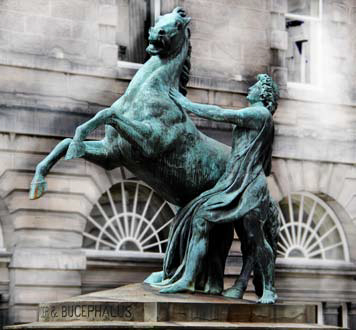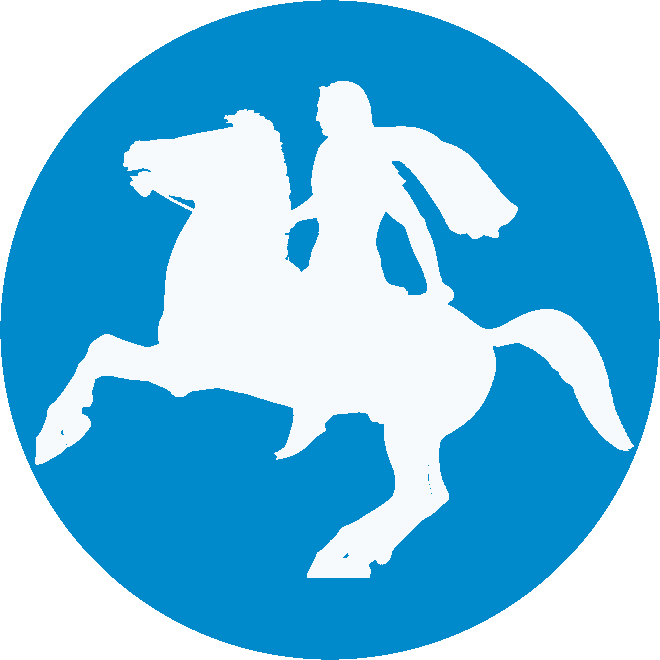His bravery, his unique heroism, his charismatic chacter, his self-denial, his broad and quick spirit was unique and never before to this extent had there been such a leader of such a huge empire. Arrianos wrote ” Alexander had great power to grab the right movement, when the situation seemed vague “.
His battles and victories unnailed everything that seemed granted up to them, such as the unbeatable Persian cavalry.
 As Hammond notes, Alexander grew up in a kingdom that continually was at war. That’s why surviving difficult war moments was a daily experience. Alexander fought first, as he was the first to climb the enemies walls, first in battle together with the soldiers of the Macedonian pilory. Alexander’s voice strong and alluring, his nature was tireless and he could exercise going up and down on a chariot. His physical strength and stature allowed Alexander to climb on Bucephalus back, incident which Philip admired the bravery of his son.
As Hammond notes, Alexander grew up in a kingdom that continually was at war. That’s why surviving difficult war moments was a daily experience. Alexander fought first, as he was the first to climb the enemies walls, first in battle together with the soldiers of the Macedonian pilory. Alexander’s voice strong and alluring, his nature was tireless and he could exercise going up and down on a chariot. His physical strength and stature allowed Alexander to climb on Bucephalus back, incident which Philip admired the bravery of his son.
His injuries were many, but he recovered quickly, by following the medical advice by doctors during that period, and having own to his physical stamina. Those which were connected with his spiritual strength which were created during his childhood.
His military thoughts and intelligence were obvious. He could inspire his men with his personal bravery in every action, while his speed in his movements and his broadness in spirit were his characteristics. His tactics were mild to the Greek cities, brought their co-operation. As king of Asia he freed people from Persian slavery and won the support of these countries. Wherever he met resistance, he proved that he was a supreme soldier, but he did not enforce guards. He took the already structure of the government through satrapy, made radical repairs and went forward to educating the young in the Greek army.
Many armies even up to today follow Alexander’s instructions in commissary, provision, whilst many leaders are inspired by the Macedonia king’s principles, values and the way of administration.
Alexander was military honourable. Before the crucial battle at Gavgamila, and even though Parmenionas proposed to attack unexpectedly at night, knowing that the Persian army was countless confessed with pride ” I’ m not stealing victory ” .
The Greek way of life, the Greek cultural standards was his view for his life, for the life of every person. Heroic and divine, and simultaneously human and immortal. Alexander’s first teacher, Lysimaxos, initated the achievements of mythical heroes, Leonidas developed his religious feeling even more, Aristole taught him to read the Iliad. The history of Filistou showed him the models of men and gods, like Hercules and Achilles, whom he desired to compete and exceed, and his father’s course, Philippou, were some of the influences that inspired and made him feel special. He wanted to achieve more labours, than most men have achieved.
Alexander believed that he should have been compared with Philip. For his father even though he came into conflict many times, Theopompos whom was a strict judge of Philip’s wrote in ” Philippika ” : ” Europe has never before had such a great man such as Philip, son of Aminta ” Philip’s aim, whom asked Pythia of Delphous if ” You conquered the land of Persia ” which became Alexander’s aim whom made it real.
Alexander wanted to become first, to exceed even the immortal Hercules. Arrianos wrote ” if we included Europe to Asia he would have competed with himself, because there was no opposition ” while Ploutarchos has Aristovoulo as as a source mentions ” Believing that he had come from the Gods, to become ruler and a conbiner of humanity, used the strength of weapon where they did not accept his persuasion, he joint all his strength for only one purpose: to join happily the lives, ways, weddings and the cultures of people. He said to all to regard his universe as home and his army as their safety ” .
From all the ancient writers (Arriano, Stravona, Ploutarchos etc) noted that Alexander had so much bravery with connection to morals, that after death, Parius’ mother, Sisygambis learning about the lose of Alexander, willingly stopped eating and died from starvation.


